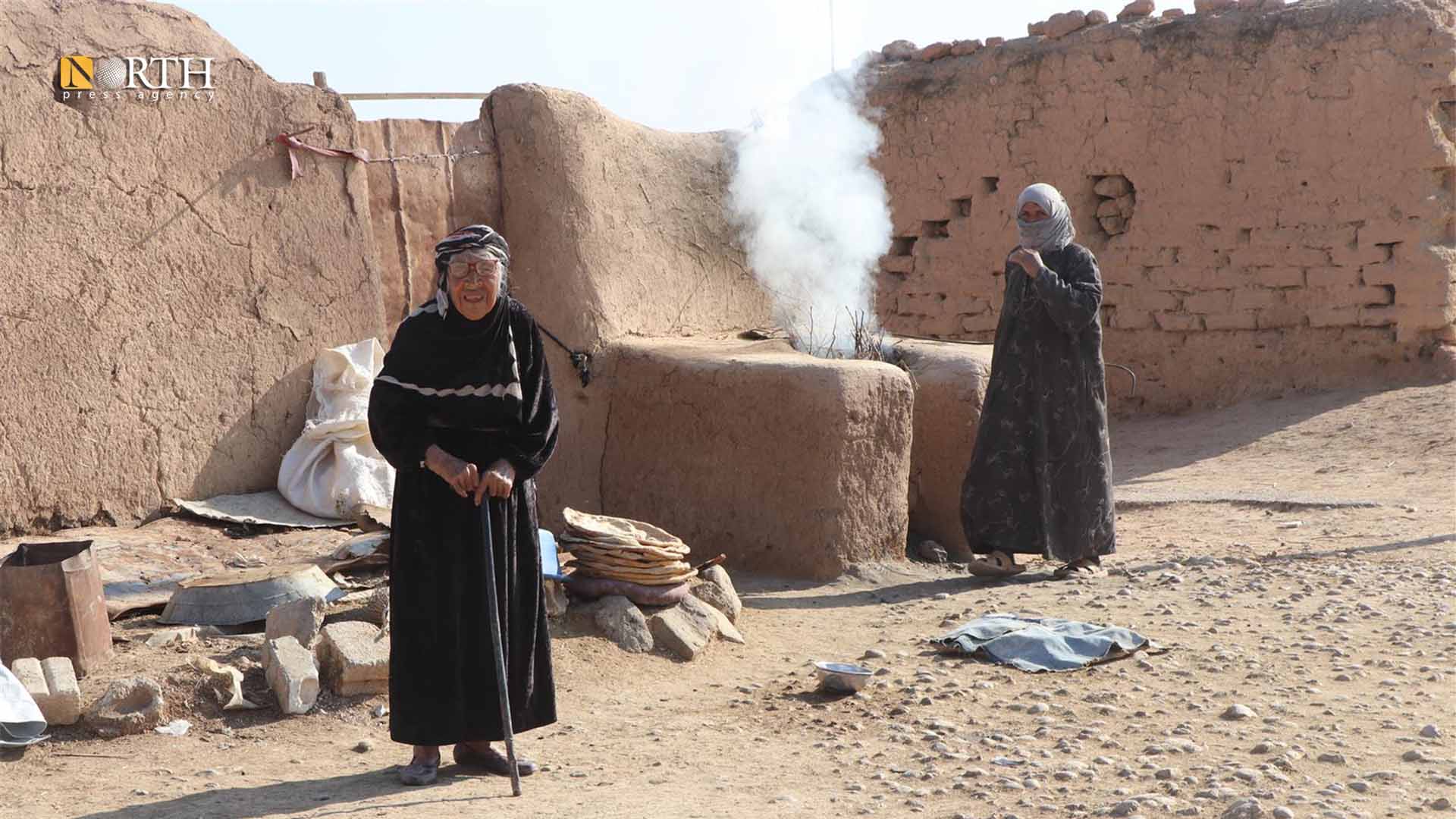TEL TAMR, Syria (North Press) – Despite the relative calm that prevails in the villages of the town of Tel Tamr, northwest Syria, civilians living on the frontline with the areas controlled Turkish forces are frightened by the sound of repeated shelling near their villages.
Since the end of 2019, dozens of villages have turned into a frontline after the invasion of Tel Abyad and Sere Kaniye (Ras al-Ain) by Turkish forces and their affiliated armed opposition groups.
The M4 Highway separates Turkish-backed armed opposition groups and Syrian government forces, which have been stationed near the front under Russian auspices.
Frightened by the shelling
55-year-old Habiba Suleiman, her head covered with a white scarf, is busy preparing bread near her house in Kozlia, ten kilometers to the west of Tel Tamr.
Habiba told North Press that her family obtains bread twice a week from the automated bakery in Tal Tamr, “and it doesn’t meet our needs, so we resort to preparing tanoor bread”.
Kozlia, in addition to dozens of villages of western countryside of the village, suffers from the difficulty of obtaining flour amid its high price. Residents of the region accuse the Turkish army of having burned their wheat and barley crops last summer.
Last June, the residents of Kozlia told North Press that they saw Turkish soldiers at their military base in al-Amriya village setting fire to agricultural land in several villages near them.
During the last harvest season, the fires destroyed 30,000 acres in Tel Tamr and Sere Kaniye, according to a previous statement by Suleiman Bardo, the co-chair of the Economic and Agricultural Body of the Autonomous Administration in North and East of Syria (AANES).
Suleiman didn’t expect her village to turn into a frontline after the expulsion of the Islamic State (ISIS) from it five years ago.
“We are frightened. Several days ago, we fled our houses in the evening due to the intense shelling,” she added.
Despite the ceasefire between the Syrian Democratic Forces (SDF) and Turkish army following US-Turkish and Russian-Turkish agreements, Turkish forces repeatedly target the villages outside of its control with heavy weapons.
War after war
Residents of the village say that it isn’t safe to cross the highway, fearing being robbed or shot by Turkish-backed armed opposition groups. Therefore, they are forced to use rugged dirt roads full of holes to reach Tel Tamr to obtain their needs.
On November 6, 2020, Turkish-backed armed opposition groups intercepted a civilian convoy despite its accompanying Russian patrol on the M4 Highway, and “they robbed the drivers and traders near al-Rihaniya village west of the town,” according to the residents.
The impact of the war against ISIS is still visible on the village school, in its broken windows and walls pockmarked with bullets and shrapnel.
Elementary school students from several neighboring villages go to a school run by the Education Board of the AANES, whereas the preparatory school students go to schools in the center of Tel Tamr.
Fifth grade teacher Mahmoud al-Hassan said the school has not had any maintenance work done for years, and has turned into a refuge for the families who fled Turkish shelling on the neighboring villages.
Security disturbances on the frontlines, which are only a few kilometers away from school, result in irregular attendance of students and the long-term disruption of the educational process.
“Students are scared when they hear the sounds of shelling, and some of them miss school because their families are worried about them,” al-Hassan added.
Hard life
Three kilometers away, the condition of the residents of Tel al-Laban village is no different. Fear of Turkish shelling concerns the residents, in addition to the lack of services.
61-year-old Tel al-Laban resident Wadha al-Jasem explains that “life is very difficult in the village amid disruption of agricultural work and deteriorating services.”
She added that the residents of her village have had no electricity for a year, while their access to water is limited and intermittent without help from humanitarian organizations.
According to the Tel Tamr Electricity Directorate, the reason for the nearly yearlong cutoff in the western countryside is due to the interruption of the main lines located within Turkish- and opposition-held areas.
Tel al-Laban resident Badra Muhammad says that the residents of her village were divided between becoming IDPs in camps and remaining in the village.
She added, “Two years ago a bombardment took place on the out skirts of the village; as we all fled to the desert, even our children could not sleep out of fear.”
The woman said, looking at the doors of her neighbors, “I am waiting for their return; there are only six families left in our village. We do not want to be displaced, but we live in constant fear.”
Muhammad indicated that most of the bombing takes place at night. “We are experiencing tragic conditions, especially since electricity has been cut off to this line since the arrival of Turkish-backed militants to the area.”

